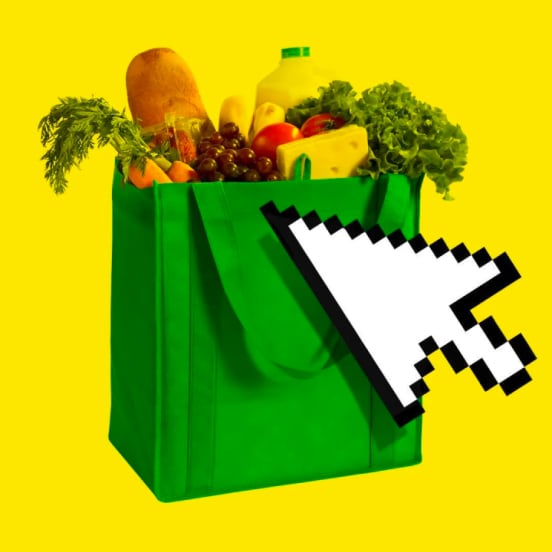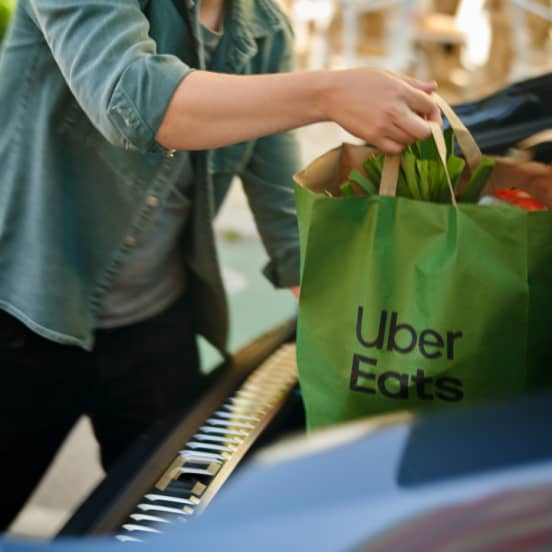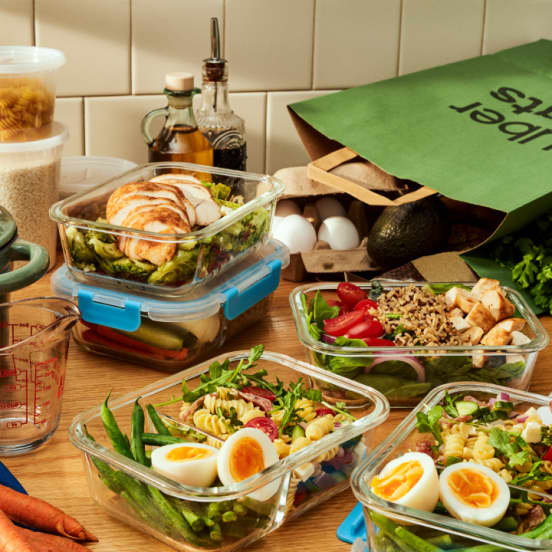Unlock patients’ access to grocery delivery with Uber Health
Limited access to nutritious foods may lead to diet-related diseases and cause costs to the healthcare system.* Uber Health aims to change that.
One platform to support a range of programs
We’re helping healthcare organizations take a "food-as-medicine" approach* in an effort to reduce chronic disease.
Value-based care
Streamline care by offering delivery services through Uber Health. Better access to groceries and OTC items may help with managing chronic conditions, post-discharge adherence, and homebound patients.
Supplemental benefit use
Uber Health streamlines coordination across multiple benefits, empowering payers and providers to support patients beyond the 4 walls of a medical office. Together, we can help provide patients with better education and greater access.
Underserved and vulnerable communities
Give patients with limited food options or food insecurity better access to groceries and OTC items. Our services can work in tandem with Medicare, Medicaid, and other programs.
Long-term patient or family stays
Help alleviate stress for families of patients who are in the hospital for extended treatments or stays. Use the Uber Health platform to arrange for groceries to be delivered to family members staying nearby.
Patient travel
Provide additional support—in the form of access to meals—to patients who need to travel for treatment of acute conditions to places like centers of excellence or other out-of-town healthcare facilities.
Delivering added value to patients
Guide patients' nutrition and health
Help your patients get the groceries you choose. Providing tools to simplify access to produce and foods to help manage chronic conditions and potentially limit acute incidents with the goal of ultimately reducing healthcare costs.
Increase member satisfaction and retention
Grocery and OTC item delivery can increase convenience for patients and empower providers to offer more holistic patient care, ultimately helping to improve the member experience.
Provide access on a national scale
Uber’s existing infrastructure and nationwide network of grocery and convenience merchants delivers on the value of “food-as-medicine”* programs across the country.
Maximize benefit dollars
Instead of paying for 2 rides to and from the grocery store or pharmacy, one-way deliveries through Uber Health may help benefit dollars of Medicaid and Medicare recipients go further, while providing added value to patients.
How it works
Step 1: Create an order
After you input the patient’s information, the Uber Health dashboard will load the Uber Eats delivery platform for you to begin item selection.
Tip: You can use member management to pre-populate delivery information in the order request form and save members’ dietary needs.
Step 2: Select items for delivery
Soon you will be able to view curated collections such as pantry essentials, prepared foods, vegetarian selections, farm-fresh goods, and maternity items, or search for and browse merchants available in your area.**
Tip: When choosing items, you can access a member’s preferences and dietary needs saved on the member profile.
Step 3: Select delivery option
Choose the delivery method that’s most convenient for each patient. You can select to leave the delivery at the door or to have the patient meet the courier outside.
Tip: Deliveries can be scheduled for the same day or up to 7 days in advance.
Step 4: Live order tracking
Once you place the order, the patient can receive a text with a link to a mobile web page to track their order. Grocery delivery cards flag orders that need your attention.
Tip: You can track the courier in real-time to ensure that deliveries are completed.
Provide better access to grocery and OTC delivery
FAQs
- What are “medically tailored meals”?
Medically tailored meals are delivered to individuals living with severe, complex and chronic illness through a referral from a medical professional or healthcare plan. Meal plans are tailored to the medical needs of the recipient by a Healthcare Provider, and are designed to improve health outcomes, lower cost of care and increase patient satisfaction.***
- Are “medically tailored meals” included in the grocery selection?
Today’s selection includes produce and other items commonly available from grocery and convenience stores, which may have some prepared food items. While diet-specific medically tailored meals are not currently available, they may be added in the future.
- Who pays for the cost of delivery and the items?
The organization pays for items, fees, and tips through the standard Uber Health billing process. In the future, organizations will be able to use patients’ grocery and OTC benefits if they have them.
- Which OTC medications are available?
Over-the-counter medications and items such as acetaminophen, ointments, vitamins, bandages, diapers or other items for current and expecting parents, and other non-prescription medical items are available for delivery in most zip codes.
- What does the term “food as medicine” mean?
Food as medicine emphasizes the crucial link between nutrition and health, promoting access to nourishing food as a fundamental component of well-being. With initiatives like the US Department of Health and Human Services’ Food is Medicine program, efforts aim to address food insecurity and chronic diseases through collaborative approaches involving communities, federal agencies, and cross-sector partnerships. Uber Health wants to play its part by increasing access to nutritional food and health-related items.
*“Food is Medicine: a project to unify and advance collective action,” US Office of Disease Prevention and Health Promotion, https://health.gov/our-work/nutrition-physical-activity/food-medicine.
**Providers are responsible for selecting item based on patient’s dietary restrictions and allergies.
***”The Medically Tailored Meal Intervention”, Food is Medicine Coalition, https://www.fimcoalition.org/our-model
Solutions
Who we serve
Resources







